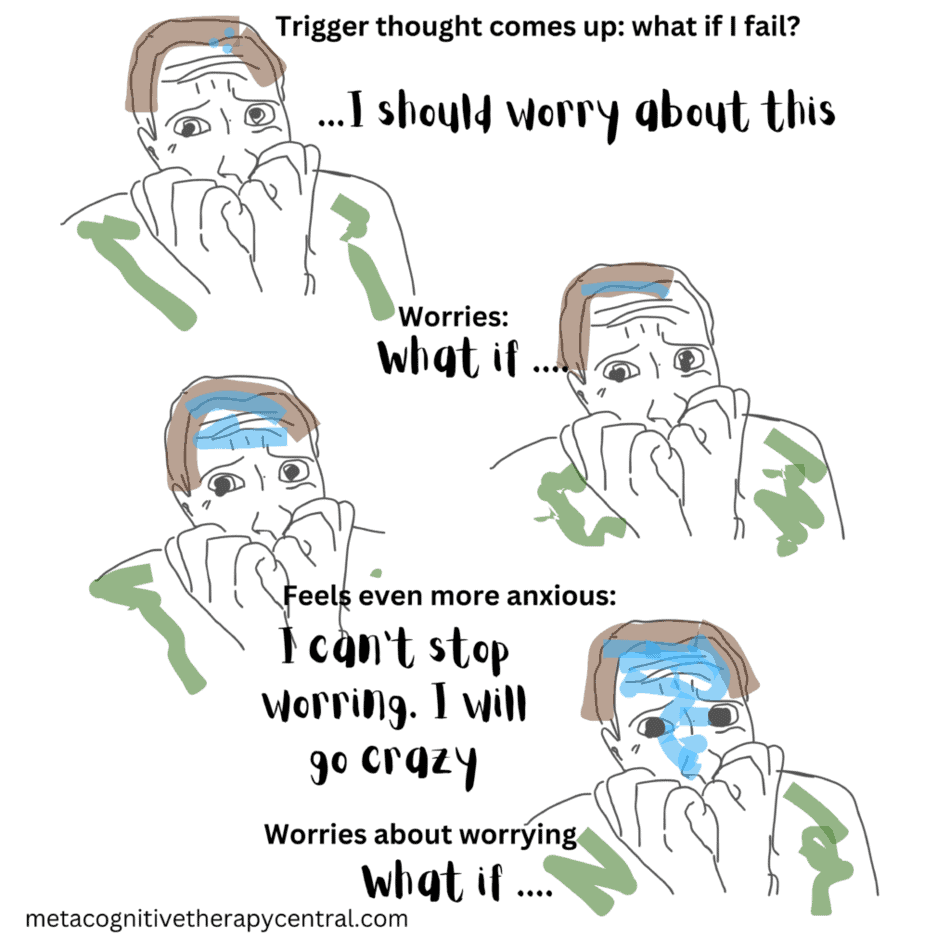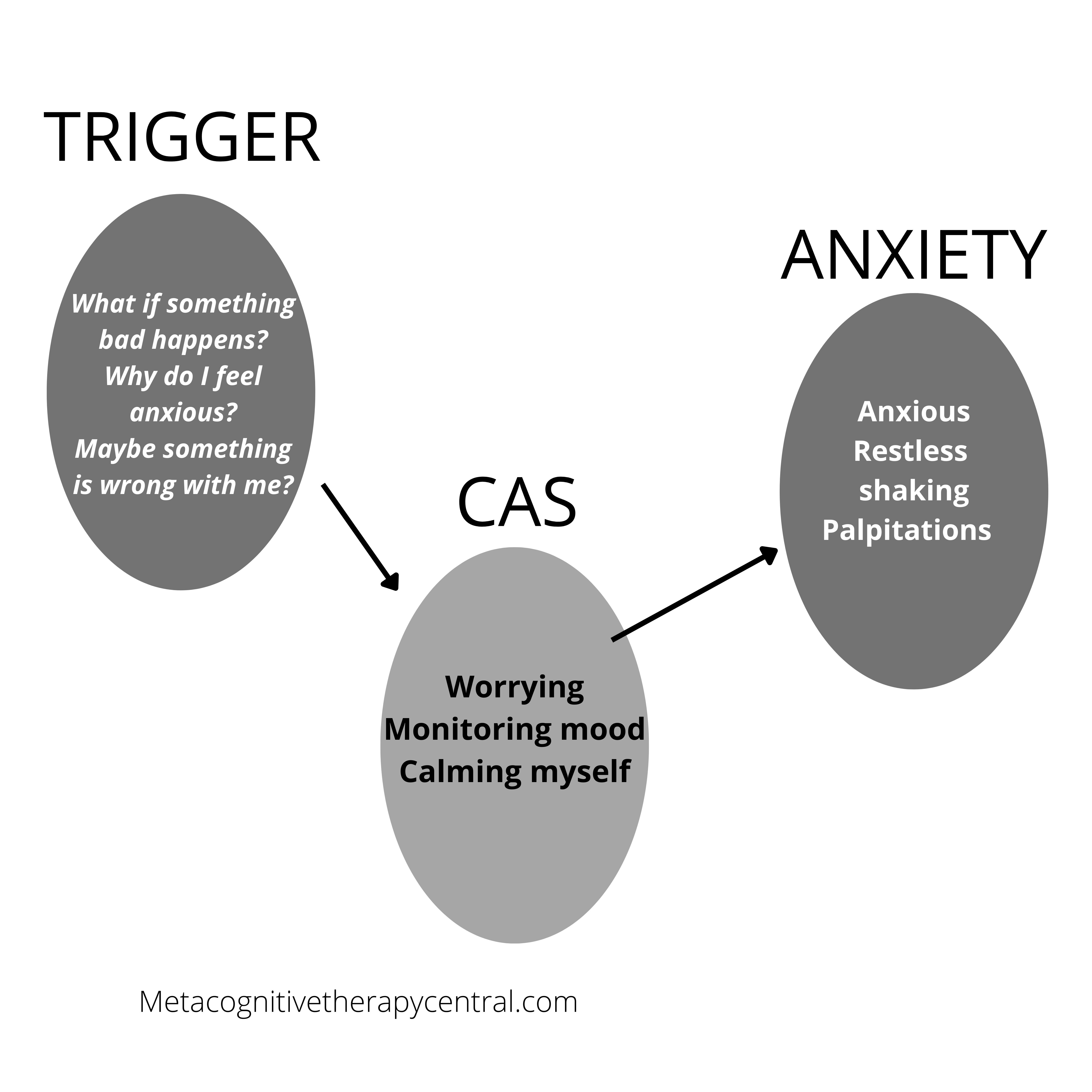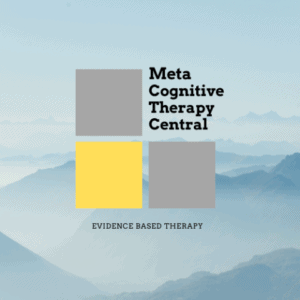
People with anxiety worry about many different things. Their job, exams, family, relationships, finances, health, and worry itself. Persistent worry, however, leads to symptoms like anxiety, stress, tension, nervousness, edginess, irritability, difficulty concentrating, insomnia, and muscle aches.
Since worrying is the core of anxiety disorders, Metacognitive therapy treats anxiety by reducing worry in 8-10 sessions. The content of the worry is not important, but meta-worry and metacognitive beliefs about worry have to be changed for permanent recovery.
Metacognitive therapy (MCT) is a different approach from other treatments because it doesn’t address the content of anxious thoughts and feelings. The reason why MCT is very effective in treating emotional disorders like anxiety is because of the theory of emotional self-regulation.
Anxious feelings are natural and brief. But the amount of time spent worrying is what maintains anxiety. Once you learn to reduce worry, you can expect anxious feelings and symptoms to fade by themselves. MCT teaches you how to reduce worry.
What is the metacognitive model of anxiety?
The metacognitive model of anxiety suggests that persistent worrying sustains anxious thoughts and emotions. To effectively recover from anxiety, it’s essential to reduce both worrying, and worrying about worrying. Additionally, altering metacognitive beliefs that trigger this worrying is crucial.

The metacognitive model of emotional disorders (also called the Metacognitive Control System Model), was developed by clinical psychologist and professor Adrain Wells from Manchester University.
According to Wells’ metacognitive model of anxiety disorder, the mind is involved in constant self-regulation and usually deals with negative thoughts, feelings, and disappointments on its own. Worrying, along with other unhelpful coping strategies, however, interferes with self-regulation and prolongs anxiety(1).
Why does worrying maintain anxiety?
Imagine your mind as a skilled mechanic who knows how to keep everything running smoothly. But when you worry too much and use unhelpful coping strategies (like avoiding situations, pushing anxious thoughts away, and monitoring for threats) it’s like tossing a bunch of wrenches into the engine. This messes up your mind’s natural balance and keeps anxiety going.
Most people begin to worry as a response to anxious thoughts that come up. This is due to an assumption that worrying is helpful (metacognition). But since worrying interferes with self-regulation, it ends up exacerbating the anxious emotions and leading to more anxious thoughts.
At that point, people’s negative assumptions about worrying are activated. These assumptions are also called negative metacognitive beliefs and signal that worrying can’t be stopped. Once negative metacognitive beliefs are activated, they lead to more worrying. This type of worrying is called meta-worry (because it is worrying about worrying: I can’t stop worrying. Worrying will make me go crazy).
Anxiety is like a loop fueled by worry and the fear of worrying, plus relying on strategies that don’t really help. These patterns of thinking keep emotions unregulated and the brain on high alert, stuck in a perpetual state of threat.

Example of how worry causes anxiety
When someone has generalized anxiety disorder, certain thoughts can set off their worries. These thoughts usually start with “What if…?” For example, they might think, “What if I lose my job and can’t provide for my family or pay rent?”
These thoughts that trigger worry are called “trigger thoughts.”
In trying to come up with solutions, they begin to worry even more (this is known as type 1 worry) about these trigger thoughts. They believe that if they worry enough, they can predict problems and prevent them. For instance, they worry about not being able to provide for their family and imagine having to sell their house and the challenges of finding a new place to live.
As they continue to worry, physical symptoms like anxiety, tension, and restlessness start to show up.
These symptoms then reinforce negative metacognitive beliefs about worry, like “My worries are taking over and I am losing control due to excessive worrying.”
Negative metacognitive beliefs then activate meta-worry, which is essentially worrying about the worrying itself. At this stage, finding a solution to the initial concern becomes increasingly difficult because all their mental energy is consumed by this constant cycle of worry.
When someone struggling with anxiety loses faith in their ability to stop this worrying, they turn to other coping mechanisms like avoidance and seeking reassurance.
Unfortunately, these coping strategies end up working against them, keeping their anxiety levels high (2).

How does MCT treat anxiety?
The goal of MCT is to reduce worrying so that the mind’s natural self-regulation can take place. In other words, MCT steps in as the expert mechanic, cleaning up the mess and letting your mind work smoothly again.
Here is how anxiety is treated in therapy:
Step 1: Reduce worry that keep the anxiety going
Step 2: Change the metacognitive beliefs that make people believe that worry is harmful and out of their control (2) (3). Change metacognitive beliefs that make people think that worrying is helpful.
Step 3: Eliminate unhelpful coping behaviors like avoidance and safety behaviors.
Does MCT for anxiety work?
Several published studies have tested the effects of MCT, which is recommended as an evidence-based treatment option for anxiety in the UK. MCT has proven to be very effective and fast for treating anxiety disorders, including generalized anxiety disorder, panic disorder, and social anxiety disorder.
A recent meta-analysis shows that MCT may be more effective than CBT in treating generalized anxiety disorder, and the patients’s anxiety symptoms are reduced at a higher rate than in CBT (4).
You can read more about the different studies on MTC here.
Here is an overview of the effectiveness of MCT for anxiety:
| 70-80% of patients recover from anxiety with MCT |
| MCT is more effective than applied relaxation (another popular treatment) for anxiety |
| MCT is better than therapies based on Intolerance uncertainty model |
| MCT is better than CBT for anxiety |
| MCT creates long-lasting change in patients with anxiety (treatment effects are stable up to 30 months) |

What maintains your anxiety? – Become aware of unhelpful strategies
People suffering from anxiety disorders (like generalized anxiety disorder, OCD, and panic disorder, and social anxiety disorder, and illness anxiety disorder), use some or all of the below unhelpful strategies whenever they experience negative thoughts and feelings:
| Worry |
| Worry about worry |
| Avoid things (situations, people, touching things, touching specific body parts that trigger anxiety) |
| Monitor for danger, anxiety symptoms, signs of disapproval |
| Suppress anxious thoughts (trying not to think about anxious thoughts or try to push them out of the mind) |
| Seek reassurance from family and friends, or search for reassurance online |
| Numb feelings with food, alcohol, or substances |
| Use distractions to avoid worrying ( through phone, tv, or by working more) |
To overcome anxiety, it is crucial to first become aware of the unhelpful strategies you often rely on. By increasing your mental awareness and recognizing the extent of your worrying, you can take the initial step toward diminishing it.
The subsequent step involves developing the ability to react to anxious thoughts in a more constructive way. This involves identifying the thoughts that trigger your anxiety and implementing Metacognitive Therapy (MCT) techniques, such as detached mindfulness and worry postponement.
What can you expect from therapy?
Some people are good at recognizing their ineffective coping strategies, but they struggle with effectively practicing detached mindfulness. This is where therapy plays a vital role. It guides people in the proper application of MCT, overseeing their progress and correcting any mistakes that might otherwise slow down and even hinder their progress.
In therapy, a significant aspect involves challenging metacognitive beliefs, as they play a crucial role in triggering worries. If these false metacognitive beliefs are not corrected, they can cause a relapse and even hinder efforts to manage worry.
A proficient MCT therapist understands the significance of addressing the client’s metacognitive beliefs and working towards a thorough transformation.
The goal of MCT therapy is therefore:
- to help you experience that you can fully control worry
- to help you have a relaxed relationship with anxiety
- to apply detached mindfulness correctly to your anxious thoughts

Worry about worry is called meta-worry, or type 2 worry: “I am losing control,” “I am going crazy”, I am harming my body”.
Where can I try MCT?
Metacognitive Therapy Central provides accessible online Metacognitive therapy. Begin with a free introductory session to develop a personalized plan on how this therapy can aid you in overcoming anxiety.
If you’re ready to start, you can book your therapy sessions directly through our platform. Metacognitive Therapy Central is committed to delivering exceptional Metacognitive therapy to support your journey towards mental well-being and ensure lasting progress. We stand by the quality of our services, if you are unsatisfied, we offer a full refund.

References
- Wells, Adrian & Matthews, Gerald. (1996). Modelling cognition in emotional disorder: The S-REF model. Behaviour Research and Therapy. 34. 881-888. 10.1016/S0005-7967(96)00050-2.
- Wells A (2008). Metacognitive Therapy for Anxiety and Depression: New York: Guilford Press
- Wells, A., Nordahl, H. (2020) Personal communication, Copenhagen
- Rawat A, Sangroula N, Khan A, et al. (2023) Comparison of Metacognitive Therapy Versus Cognitive Behavioral Therapy for Generalized Anxiety Disorder: A Meta-Analysis of Randomized Control Trials. Cureus 15(5): e39252. doi:10.7759/cureus.39252
